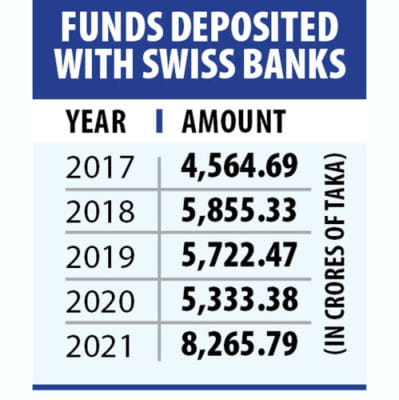Bangladeshi individuals, Banks: Deposits with Swiss banks rise 55pc

Funds deposited by Bangladeshi citizens and banks with different Swiss banks witnessed a massive rise of 55 percent to 871 million Swiss francs (CHF), about Tk 8,266 crore, in 2021 compared to the previous year.
Of the amount, CHF 844 million belongs to different banks and the rest to Bangladeshi nationals, according to data released by the Swiss National Bank yesterday.
In 2020, funds parked by Bangladeshi individuals and banks in Swiss banks dropped 6.6 percent to CHF 563 million (about Tk 5,215 crore), which was a decline for the third year in a row.
The data does not specify who the amounts belong to and whether the funds were laundered from Bangladesh.
This comes amid an announcement by Finance Minister AHM Mustafa Kamal in the proposed budget about the amnesty to undisclosed assets or cash stashed in foreign shores. Economists termed it "ethically unacceptable" as it would encourage more money laundering.
The minister proposed that money laundered out of the country can be legalised in exchange of seven to 15 percent tax from next year to boost revenue as well as mobilise foreign currency.
Not only Bangladesh, deposits from India and Pakistan with Swiss banks also surged last year.
Deposits from India increased by over 50 percent to CHF 3.83 billion in 2021, up from CHF 2.55 billion the previous year.
From Pakistan, deposits surged to CHF 710 million in 2021 against CHF 640 million in 2020.
However, deposits from the crisis-hit Sri Lanka plunged to CHF 60 million last year, down from CHF 130 million in 2020.
Switzerland has long been a preferred destination for the wealthy from all over the world to park their funds for tax evasion purposes, thanks to the high level of confidentiality protections the country's banking law allows.
Like people from all over the world, Bangladeshis have been stashing their funds in Swiss bank accounts.
Ahsan H Mansur, executive director of the Policy Research Institute, said the deposits cannot automatically be attributed as black money as the Bangladesh government and particularly the Bangladesh Bank keep their funds in Switzerland too alongside Bangladeshi nationals working abroad.
"However, launderers also could hide their funds there."
The Bangladesh government, he said, can ask the Swiss government to provide information about the funds deposited with their banks. "So, it can assess how much illegal wealth is stashed there."
However, the lure of Switzerland as a tax haven has come off in recent years among Bangladeshis, said Mansur, a former economist of the International Monetary Fund.
There are other options like Jersey, Cayman Islands, Panama, Singapore and Dubai, UAE.
He said most of the Bangladeshi money launderers now don't deposit their money in foreign banks, rather they invest in different sectors.
"A big portion of the money goes to the real estate sector in different countries as investment."

 For all latest news, follow The Daily Star's Google News channel.
For all latest news, follow The Daily Star's Google News channel. 



Comments